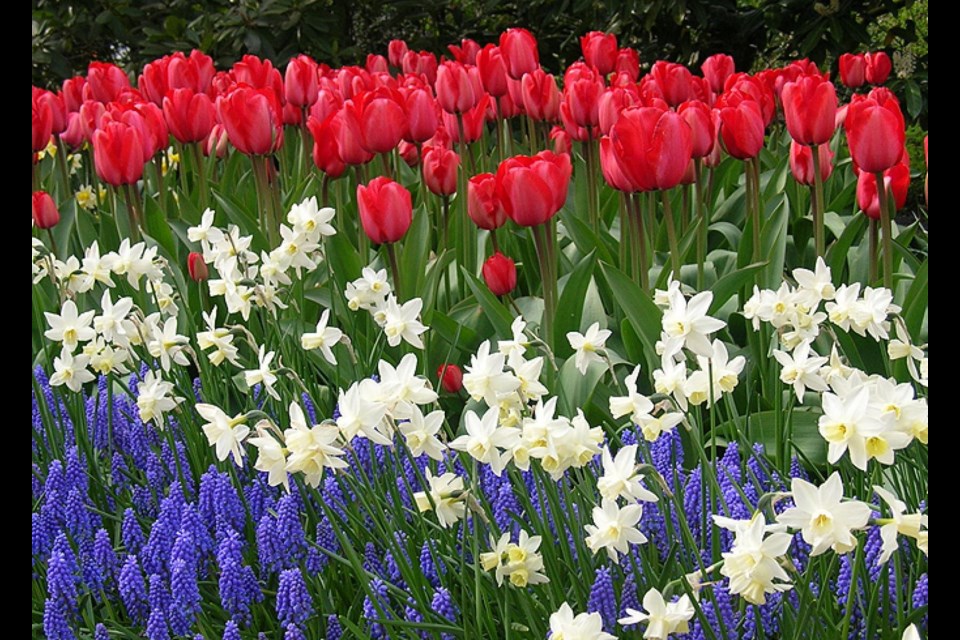As fall continues, it is time to complete some tasks that are perfectly suited to doing while it is still warm outside – at least during the daylight hours. Although September is the perfect time to plant spring flowering bulbs, there is still time. These bulbs which bloom in the early spring must be planted in the fall to allow the bulb to develop a good root system. These bulbs also need a cold period (winter) to allow their flowers to fully develop. For best results plant them well before our ground freezes as these colourful additions to the garden are inexpensive, simple to plant and require very little for care.
Size matters. When purchasing bulbs, it is important to remember that this is one instance when you truly get what you pay for. The larger bulbs of each flower type will without fail give you a better product. Take time to examine the flesh of the bulb as it should be smooth and free of any blemishes. Your favourite garden centre should have plenty of stock now that will ensure you can enjoy the latest bulbs of your dreams come spring.
Bulbs should be planted in a well-drained area. The soil should be free of weeds and dug to a depth of about 12 inches (30 centimetres). If your soil is heavy clay soil, incorporate equal portions of coarse sand and a suitable organic matter like compost. A good rule of thumb is to incorporate a good four to six inches (10 to 20 centimetres) of organic matter before planting. Apply a standard bulb booster fertilizer (9-9-6) or bone meal at planting time to encourage a vigorous and healthy root system.
The planting depth will vary for each type of bulb, but a good rule of thumb is to plant the bulb to a depth of three to four times the width of the bulb. Therefore, if you are planting a tulip bulb that is two inches (5 centimetres) wide, it should be planted 8 inches (20 centimetres) deep. After planting, water the soil thoroughly and mulch the surface with leaves or grass clippings to a depth of two inches (five centimetres).
When planting spring bulbs, you will get the best impact if you group the same type of bulb. The bigger the grouping the larger the impact will be. Most spring flowering bulbs are low in stature. What that means from a design perspective is that they should be planted at the front of the border but also somewhere that enables you to enjoy the show regularly. Spend a bit of your fall in the garden planning for spring and plant some spring flowering bulbs so you can enjoy the grand show in the spring.
Choose hardy stock that will survive in your climate zone. Tulips, species tulips like Tulipa tarda, scilla and crocus are your hardiest choices but in the right location daffodils, puchkinia, fritilarias and grape hyacinth will also work well. Hyacinths will be fine for Zone 4 and above, depending on the species.
I have a love of all tulips. You can extend the spring season by planting a collection of early, mid and late flowering selections. Spring on the prairies is often short so play with the climate and extend every season by planting for extending the colour. Do remember that a lot of the exotic tulips are not perennial and you may need to replant annually. However, if you use some of the old tulip types like Darwin, you should be able to enjoy many years of blooming tulips.
Plan for spring......plant now so you can spend the long winter anticipating the show you are creating that will be enjoyed in the spring.
Hanbidge is the Lead Horticulturist with Orchid Horticulture. Find us at www.orchidhort.com; by email at [email protected]; on Facebook @orchidhort and Instagram at #orchidhort.
Tune into GROW Live on our Facebook page https://www.facebook.com/orchidhort or check out the Youtube channel GROW https://www.youtube.com/channel/UCzkiUpkvyv2e2HCQlFl0JyQ?




